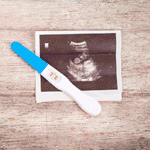Your pregnancy: 14 weeks pregnant

This page contains affiliate links, which means we may earn a small amount of money if a reader clicks through and makes a purchase. All our articles and reviews are written independently by the Netmums editorial team.
Find out what to expect this week, now that you're 14 weeks pregnant and into your second trimester. We look at what's going on inside you as well as on the outside. Plus – assuming that your appetite is back – a reminder about how to eat safely for the remainder of your pregnancy.
What's happening at 14 weeks?
Here are the key things you can expect from your pregnancy at this stage:
- Your hair's thicker and fuller than ever.
- Your fingers and feet may start to swell up.
- Nosebleeds may start.
- Your appetite returns (hopefully) and cravings may kick in.
How big is your baby?
Your baby is around the size of a Terry's Chocolate Orange this week, measuring about 8.7cm from crown to rump and weighing about 43g.
Any day now will see the start of another growth spurt: the energy previously needed to develop organs and features is now being channelled into growing and maturing.
FREE NEWBORN NAPPIES
Importantly, your baby is starting to hone their reflexes, so will squirm if you poke your tummy (gently, of course). You probably still won't feel it quite yet though, especially if this is your first baby.
Amazingly, baby boys now have all the structure in place to enable them to produce sperm, and baby girls will already have ovaries which, at birth, will contain all the eggs she'll ever have. Imagine that; the building blocks of your future grandchildren!

What's going on with your body?
Got that ‘just stepped out of the salon’ bounce to your locks? Many mums-to-be notice that their hair feels and looks thick and lustrous – that's because you hold on to a lot of the hairs you would normally shed on a daily basis.
Many women swear that pregnancy is the best their hair's ever looked, so enjoy it while it lasts! Sadly, at some time after you've had the baby, you'll notice your hair start to shed again.

Swelling (also known as oedema) is another normal pregnancy side-effect that many women experience. It's caused by the extra fluid in your system, and it often happens at the end of the day.
You might also notice your rings getting tight on your fingers or your strappy sandals leaving little welt marks on your feet.
Swelling is also common around the lower legs and ankles, so if you've suddenly got 'cankles', that'll be why! Many women find that pregnancy swelling gets worse in hot weather, too.
The following tips can help to reduce pregnancy swelling and help you feel more comfortable:
- Put your feet up as much as you can. If you work on your feet, ask your employer if you can take more rest breaks, so you're not standing up for too long at once.
- Wear comfortable shoes and socks; those tight-fitting heels may be gorgeous, but some comfy flats can help to reduce swelling.
- Drink plenty of water. It may seem counter-intuitive, but drinking lots can help your body to get rid of fluids faster, reducing swelling.
- Take gentle exercise; regular walks can help keep the blood flowing and stop fluid from building up in one area. You can also try foot exercises; rotate your ankles every once in a while when you're sitting down.
Always speak to your doctor or midwife urgently if you have sudden swelling in your hands, feet or face as this can sometimes be a sign of pre-eclampsia.
You've probably already noticed a different kind of 'swelling' around your chest; your boobs may well be enormous by now! So if you haven't already got one, now can be a good time to invest in a maternity bra.
Your breasts may even starting to produce colostrum now, or over the next few days and weeks. This is your baby's first milk, rich in nutrients to get them off to the best start in life. If leaking breasts are causing you issues, it's time to start using breast pads.
What to expect this week: nosebleeds
Just when you thought you'd experienced all the weird pregnancy side-effects... It turns out nosebleeds are another strange symptom that's actually pretty normal.
According to the NCT, around one in five pregnant women experience nosebleeds during pregnancy.
It’s not known exactly why nosebleeds happen during pregnancy, although it's likely to be down to hormonal changes and increased blood flow.
Although they may give you a bit of a fright, they're not likely to be a sign that anything's wrong with your health or your baby, so don't worry. They can happen during the night, so if you wake up one morning with a red pillow, don't panic!
If your nosebleeds are particularly heavy or you feel unwell with them, talk to your GP or midwife about them.
However, if they're fairly light, there's not much you can do other than try to stop them. Here's what the NHS advises doing if you get a nosebleed:
- Sit down and firmly pinch the soft part of your nose, just above your nostrils, for 10 minutes. (In the past, it used to be recommended to lean back, but nowadays we know it's better to lean forwards. If you lean back, the blood can run down your throat and irritate your tummy.)
- Lean forward and breathe through your mouth. This will drain blood down your nose instead of down the back of your throat.
- Stay upright, rather than lying down, as this reduces the blood pressure in the veins of your nose and will discourage further bleeding.
- Maintain the pressure on your nose for up to 20 minutes (time this on a clock) so that the blood clots.
- Place a covered ice pack on the bridge of your nose.
- Avoid blowing your nose, drinking hot drinks, bending down and strenuous activity for at least 12 hours after a nosebleed.
What to do this week: eat safely (still)
It's entirely possible that you've not had a huge appetite in pregnancy so far. However, once morning sickness disappears (usually at the start of your second trimester) your appetite should return.
If you've not paid much attention to what you can and can't eat during your pregnancy, here's a quick guide to the common questions about your fave foods:
Sushi
It’s fine to eat sushi as long as the fish used to make it has been frozen first to kill off any parasites that may be present. If a shop or restaurant buys in ready-made sushi (which many do), the raw fish used will have been frozen so you should be safe. If in doubt, ask.
Smoked fish
Whoop whoop for Sunday brunch! Smoked salmon and smoked trout are both safe to eat during pregnancy.
Eggs
Runny eggs are back on the menu for pregnant women. As long as the eggs are stamped with a red British Lion Quality mark then they are considered safe to eat in pregnancy soft-boiled or raw. Who's for a dippy egg? (If the eggs don't have a red Lion mark on them, make sure they're fully cooked until both the yolk and the eggs are solid.)
Peanuts
Ah, peanuts. The debate about whether these are safe to eat during pregnancy has raged for years but current advice is that they are safe, unless you have an allergy. Latest research has shown no clear evidence that eating peanuts during pregnancy affects the chances of your baby developing a peanut allergy.
Ice cream
Soft ice cream is made with pasteurised milk and eggs so is safe to eat during pregnancy. Be cautious with Mr Whippy, though – the machines they’re made in may be contaminated with listeria, so you may prefer to stick to tubs, to be on the safe side. If you want soft ice cream from an ice-cream van, make sure the van has a good hygiene rating.
Coffee
You need to limit caffeine to 200mg a day as consuming more than that has been associated with miscarriage and low birth weight. Be careful with coffee shops, though – a double shot (which is standard in many places) can be 150mg in one go. Calculate how much caffeine you're having, here.
Honey
It’s fine for pregnant women, just not for babies under a year old.
Live or probiotic yoghurt
It’s safe to eat these as long as they’re pasteurised.
BBQs
Barbecued meat is fine as long as it’s cooked right through and is piping hot – so just avoid any BBQ novices who may torch the outside but leave the inside raw. It’s also best to give the burgers that have been idling on the grill a wide berth, as nasties such as E.Coli or campylobacter could give you food poisoning and make you feel very ill (although won’t harm your baby)
Salad
Don’t eat salads that have been hanging around out of the fridge in warm weather, because bacteria can thrive once they’re out of a chilled environment. For the same reason, unless it’s chilled, you might want to give the supermarket or restaurant salad bar a miss, too. Always wash salad products well before eating, as soil could be contaminated with toxoplasmosis.
Alcohol
It’s now recommended that you avoid drinking alcohol altogether if you’re pregnant or trying to get pregnant.
Still have questions? Check out our A-Z of pregnancy food safety, covering everything from alcohol to yoghurt.
Your 14 week to-do list
1 Cravings kicked in? Whether it's sweet or salty, stock up in your weekly shop so that you're not caught short when cravings come calling.
2 Don't eat for two. Remember you only need an extra 200 calories a day and that's in the last trimester! Get heathy snack inspiration ideas here.
3 Put your feet up. If you notice your feet are swelling up by the end of the day, carve out some time to put them up (literally) for 10 minutes or as long as possible, to help de-puff those ankles.
4 Get some early nights. While you're still able to sleep well and before your bump gets too big, enjoy getting in some zzzs, while you can.
5 Don't forget your pelvic floor exercises! If you haven't yet, set a reminder on your phone. You'll thank yourself after your baby's born!
What to watch this week...
Get expert tips on what to expect at 14 weeks pregnant from our midwife.
What happens next week...
Want to know what happens when you're 15 weeks pregnant? Or remind yourself what you read last week? Click on the numbers above to find out more about what to expect when you're that number of weeks pregnant.




